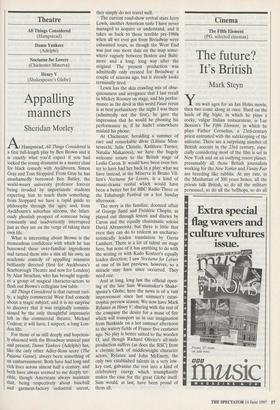Theatre
All Things Considered (Hampstead) Damn Yankees (Ade1phi) Nocturne for Lovers (Chichester Minerva) Henry V (Shakespeare's Globe)
Appalling manners
Sheridan Morley
AHampstead, All Things Considered is a first full-length play by Ben Brown and it is exactly what you'd expect if you had locked the young dramatist in a master class for black comedy with Ayckbourn, Simon Gray and Tom Stoppard. From Gray he has unashamedly borrowed Ben Butley, the world-weary university professor forever being invaded by importunate students expecting him to teach them something; from Stoppard we have a rapid guide to philosophy through the ages; and, from Ayckbourn's suburban sitcoms, the hilari- ously ghoulish prospect of someone being constantly and inadvertently interrupted just as they are on the verge of taking their own life.
What is interesting about Brown is the tremendous confidence with which he has borrowed these over-familiar ingredients and turned them into a mix all his own, an academic comedy of appalling manners brilliantly directed (first for Ayckbourn's Scarborough Theatre and now for London) by Alan Strachan, who has brought togeth- er a group of magical character-actors to flesh out Brown's collegiate low table.
All Things Considered is that current rari- ty, a highly commercial West End comedy about a tragic subject, and it is no surprise to discover that it was originally commis- sioned by the only thoughtful impresario left in the commercial theatre, Michael Codron; it will have, I suspect, a long Lon- don life.
For those of us still deeply and hopeless- ly obsessed with the Broadway musical past and present, Damn Yankees (Ade1phi) has, like the only other Adler-Ross score (The Pajama Game), always been something of an embarrassment. Both have had long and rich lives across almost half a century, and both have always seemed to me deeply ter- rible, though Americans always maintain that, being respectively about baseball and garment-factory industrial unrest, they simply do not travel well.
The current road-show revival stars Jerry Lewis, another American taste I have never managed to acquire or understand, and it takes us back to those terrible pre-1980s when all we ever got from Broadway were exhausted tours, as though the West End was just one more date on the map some- where vaguely between Boston and Balti- more and a long, long way after the original. The present production was admittedly only created for Broadway a couple of seasons ago, but it already looks terminally tired.
Lewis has the skin crawling mix of obse- quiousness and arrogance that I last recall in Mickey Rooney on stage, and his perfor- mance as the devil in this weird Faust rerun is at best perfunctory: the night I was there (admittedly not the first), he gave the impression that he would be phoning his performance in, if he hadn't somewhere mislaid his phone.
At Chichester, heralding a summer of rare and remarkable divas (Liliane Mon- tevecchi, Julie Christie, Kathleen Turner, Natalia Makarova), we have the hugely welcome return to the British stage of Leslie Caron. It would have been even bet- ter to have had her back in a play: what we have instead, at the Minerva in Bruno Vil- lien's Nocturne for Lovers, is a kind of music-drama recital which would have been a better bet for BBC Radio Three or the Edinburgh Festival on a hot Sunday afternoon.
The story is the familiar, doomed affair of George Sand and Frederic Chopin, as played out through letters and diaries by Caron and the equally charismatic soloist David Abramovitz, but there is little that even they can do to redeem an uncharac- teristically leaden translation by Gavin Lambert. There is a lot of talent on stage here, but none of it has anything to do with the writing or with Kado Kostzer's equally leaden direction; I saw Nocturne for Lovers at one of its last previews, however, so a miracle may have since occurred. They need one.
And at long, long last the official open- ing of the late Sam Wanamaker's Shake- speare's Globe; here the news is of a vast improvement since last summer's catas- trophic preview season. We now have Mark Rylance as Henry V, sharing with the rest of the company the desire for a muse of fire which will transport us in our imagination from Bankside on a hot summer afternoon to the watery fields of France five centuries ago. No play is better suited to the wooden 0, and though Richard Olivier's all-male production suffers (as does the RSC) from a chronic lack of middleweight character actors, Rylance and John McEnery, the only two established talents in a very low- key cast, galvanise the rest into a kind of celebratory energy which triumphantly makes the case for the great Globe itself. Sam would, at last, have been proud of them all.










































































 Previous page
Previous page